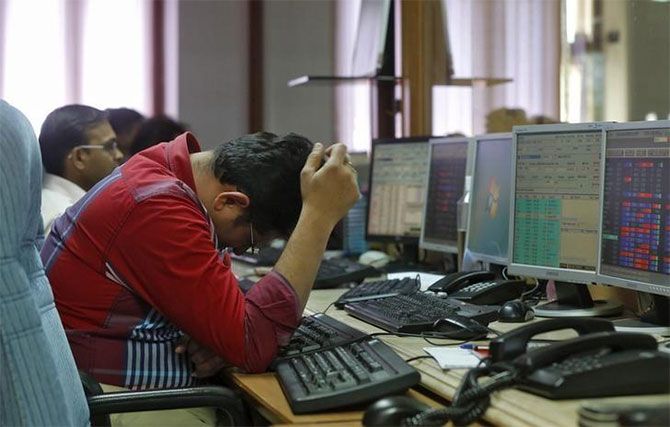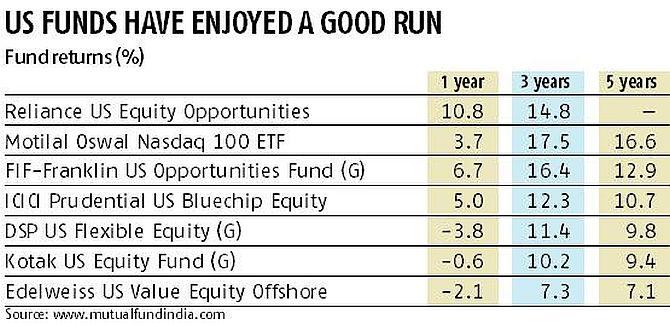If investors are concerned about a slowdown in the US or even globally, then large, globally diversified businesses are the safest place to be invested in, experts tell Sanjay Kumar Singh.

The yield curve inverted in the US for a while, with 10-year government bonds offering a lower yield than two-year bonds.
Inversion of the yield curve is widely regarded as a lead indicator of recession.
On August 14, when this happened, the Dow Jones Industrial Average (DJIA) tanked 800.49 points.
In India, financial advisors recommend US funds as the first category of international funds to investors wishing to diversify geographically.
Many investors who hold US funds are getting jittery due to all the ongoing talk of recession.
Experts say US funds should be a long-term allocation in investors' portfolios.
"It is difficult to time equity investments, more so in international equities of which most investors have even less knowledge than they have of domestic equities," says Radhika Gupta, chief executive officer, Edelweiss Mutual Fund.
These funds should hence be held across economic cycles with an investment horizon of above five years.
Gupta adds that economic cycles are inevitable.
"Even the Indian economy experiences periods of difficulty, but you don't stop investing in domestic equities for that reason," she says.
Even if investors were to pull money out of US funds, they would find themselves short of alternatives, as India, too, is facing growth-related challenges.
The key reason investors venture into US funds is to reduce single-market risk through diversification.
That logic remains valid even today.
"If you compare calendar-year wise returns, no one market outperforms every year.
"Different markets do well in different years.
"That is why international diversification is important as it helps reduce portfolio volatility," says Kaustubh Belapurkar, director-manager research, Morningstar Investment Adviser India.
The top holdings of US funds are typically companies such as Amazon, Apple, Microsoft, and so on.
These are not US-centric but global businesses.
"If investors are concerned about a slowdown in the US or even globally, then large, globally diversified businesses are the safest place to be invested in, as their ability to handle a slowdown is much better than that of most other parts of the markets," says Vishal Dhawan, chief financial planner, Plan Ahead Wealth Advisors.

All international funds are taxed at par with debt funds in India.
Investors get to enjoy the more favourable long-term capital gains tax treatment only after three years.
"Exiting early could subject gains to short-term capital gains tax," says Gupta.
However, if the weight of US funds has exceeded the designated allocation in an investor's portfolio, he may go for some profit booking.
Experts say this is as good a time as any for investors, who don't have any exposure to international funds, to start investing in them.
First, such investors should get their allocation to domestic equity and debt funds in place.
"Investors may begin with a 5-10 per cent allocation to international funds in their equity portfolios," says Belapurkar.
Dhawan suggests this should be scaled up to 20 per cent over time for these funds to have a meaningful impact.
Belapurkar advises using the systematic investment plan (SIP) route even in international funds to avoid timing risk.
US funds should be the first option of investors diversifying internationally.
The US market, which is part of the developed-market basket, has a low correlation with the Indian market.
And since these funds are dollar-denominated, they provide a currency hedge.
"The Indian rupee has a tendency to depreciate against the dollar over the long run. Acquiring a currency hedge by investing in these funds is especially useful for investors who have dollar-denominated financial goals, such as sending a child to a US university," says Dhawan.
Finally, those entering US funds now should avoid sector-specific funds and stick to broadly-diversified ones.












 © 2025
© 2025